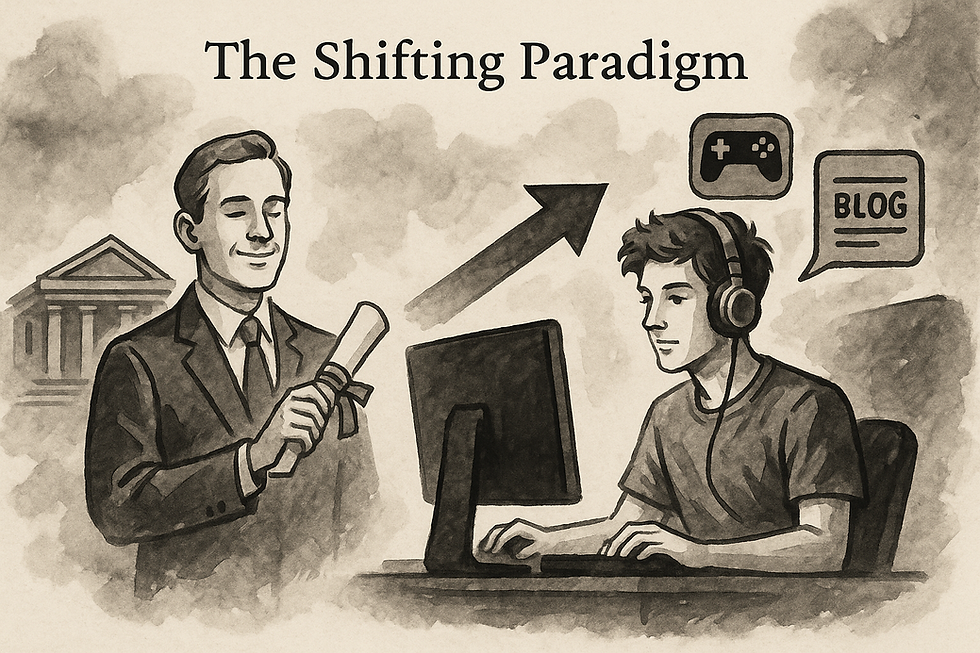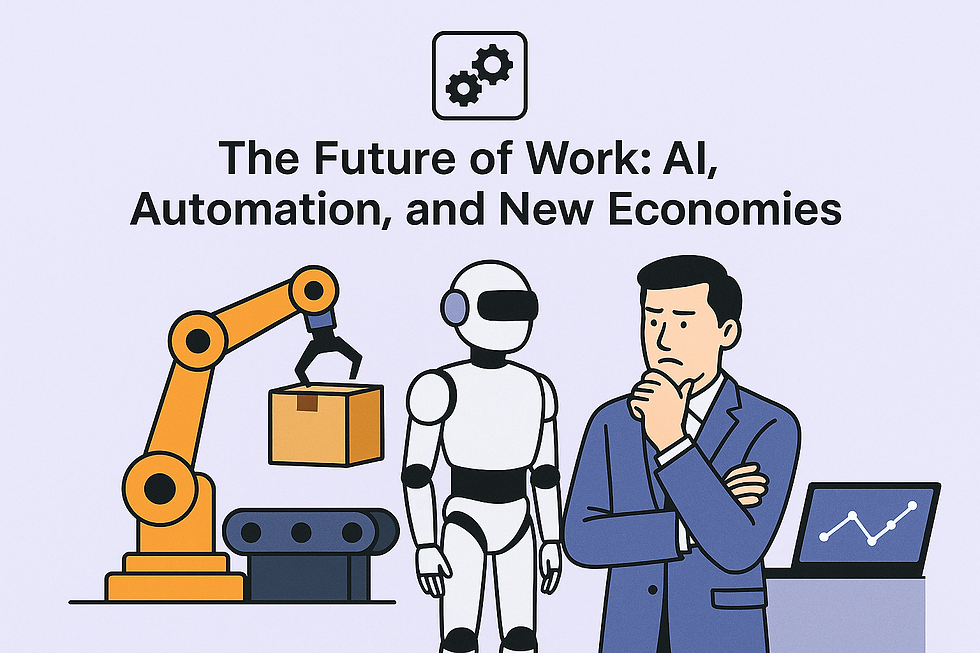💼 The Changing Landscape of Jobs: Embracing a New Future
- Saddam Hussain
- Aug 7, 2025
- 4 min read
“The illiterate of the 21st century will not be those who cannot read and write, but those who cannot learn, unlearn, and relearn” - Alvin Toffler
As the world rapidly evolves, the nature of jobs is undergoing a massive transformation. The traditional path, where schools and universities focus on grooming students for white collar jobs like engineering, law, and medicine, is being challenged. Emerging fields such as gaming, content creation, and AI based careers are offering opportunities that were once unimaginable. A post by EA Sports highlighting how some gamers are now earning more than IIT graduates is a prime example of how unconventional career paths are breaking through societal norms.
The Shifting Paradigm

Historically, success has been synonymous with academic excellence, a college degree, and landing a secure, well-paying job. For years, these "conventional" careers were seen as the gold standard, while industries like gaming and blogging were considered mere hobbies or side hustles. But as we move further into the digital age, it’s becoming increasingly clear that the future may not revolve around traditional career models. Instead, new industries that leverage technology, creativity, and individual talent are emerging with unprecedented growth.
The Future of Work: AI, Automation, and New Economies

The rise of artificial intelligence and automation has already started reshaping industries. AI is now capable of performing many tasks traditionally done by humans, from data analysis to customer service, and the trend is only expected to accelerate. There’s a genuine concern that many white-collar jobs, particularly in software development and other technical fields, may no longer require human intervention as AI systems grow more sophisticated.
Similarly, manual labor jobs are being automated, with robots performing tasks more efficiently and at a lower cost than human workers. This leaves many wondering: *What will humans do in a world where robots perform the bulk of the work?*
A Shift in Education: Preparing for New Job Markets
To prepare for this future, it’s imperative that educational systems evolve. Currently, many schools still emphasize white collar jobs while neglecting fields like gaming, streaming, or content creation. But the success of individuals in these industries shows that there’s a growing demand for skills that fall outside the conventional framework.
Governments and institutions should take note of these changes and be proactive about adapting curricula to meet the needs of a new economy. Rather than only teaching students how to excel in traditional careers, we need to embrace creativity, digital literacy, entrepreneurship, and other skills that will enable individuals to thrive in a rapidly evolving world.
Here are some fields that should be considered for inclusion in modern curricula:
1. Gaming & E-Sports: Competitive gaming has become a billion dollar industry, offering lucrative careers not only to professional gamers but also to content creators, game designers, and influencers.
2. Digital Content Creation: Platforms like YouTube, Instagram, and TikTok have made it possible for people to earn a living through creative content creation. Learning how to produce high quality content and build an audience could become essential skills.
3. AI & Robotics: As AI and robotics continue to revolutionize industries, it’s crucial that students learn how these technologies work and how they can integrate them into various professions.
4. Freelancing & Remote Work: With the rise of remote work, freelancing platforms are providing opportunities for individuals to take control of their careers, offering flexibility and the chance to work with global clients.
5. Sustainable & Green Jobs: As the world grapples with environmental challenges, there will be increasing demand for skills in sustainability, renewable energy, and environmental conservation.
Government’s Role: Supporting a Flexible Workforce
Governments will need to take a proactive role in fostering this shift. Instead of clinging to outdated job models, they should recognize the potential of emerging industries and develop policies that support them. For instance, establishing subsidies or grants for individuals pursuing careers in nontraditional fields could help remove the stigma and make these careers more accessible. Governments could also invest in reskilling programs to help workers transition from industries impacted by automation to newer, tech-driven fields.
Another key consideration is the potential future scenario where robots and AI dominate the workforce. In such a world, a universal basic income (UBI) may become a necessity, where citizens receive a government stipend to cover basic living expenses, allowing them the freedom to pursue creative or innovative endeavors without the pressure of working a traditional job.
Embracing a Future of Unlimited Potential
The future of work is not something to fear but to embrace. Rather than resisting change or holding on to outdated job structures, we should view this transformation as an opportunity. The potential to create new industries, redefine success, and offer fulfilling careers to a wider range of people is vast. We need to cultivate an open-minded, elastic approach to work, one that welcomes unconventional careers and empowers individuals to explore new ways of thriving.
The key to navigating the future will be adaptability, both at the individual and societal levels. If we can expand our understanding of what a “career” looks like, embrace digital and creative industries, and anticipate the impact of AI and automation, we will be better prepared for a future that holds far more opportunities than we can currently imagine.
Conclusion
The nature of jobs is changing rapidly, and it’s time we rethink how we prepare for this shift. Gaming, content creation, and other unconventional careers are already proving to be viable alternatives to traditional paths. As AI and automation reshape industries, embracing new skill sets, industries, and flexible work arrangements will be crucial for the future. Governments, schools, and individuals must adapt and embrace the elasticity of the job market to ensure that everyone can find fulfillment and success in this new world.

Comments